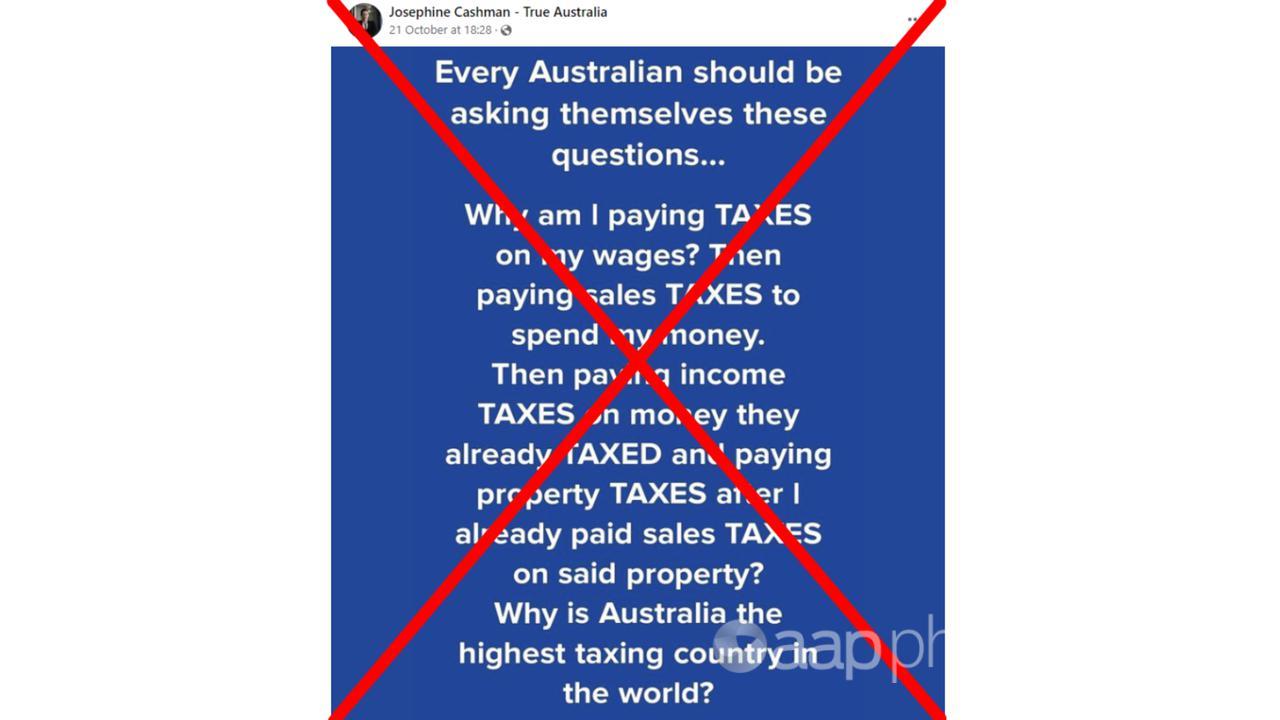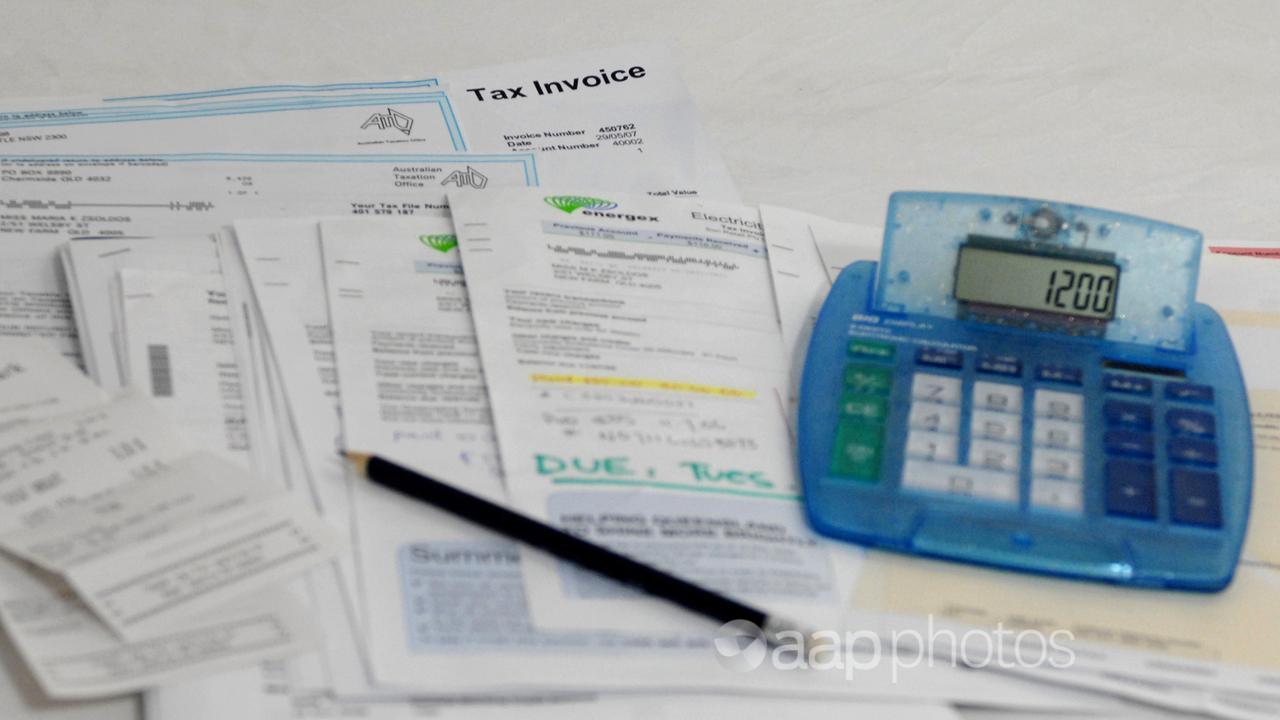A Facebook post from a lawyer and political aspirant claims Australia is the highest taxing country in the world.
Former crown prosecutor Josephine Cashman, who was a One Nation candidate in the 2022 federal election, made the claim in a post (screenshot here) on October 21.
“Why is Australia the highest taxing country in the world?” Ms Cashman says as part of the post questioning Australia’s taxation system.
The claim is false, with experts in economics and taxation telling AAP FactCheck that Australia is nowhere near the top-taxing nation.
OECD data shows Australia ranks as one of the lowest-taxing countries, recently coming in 29th out of its 38 member nations.

John Quiggin, an economics professor at the University of Queensland, told AAP FactCheck the post’s claim “is nonsense”
Professor Quiggin says the “best single measure” of a nation’s taxes is the ratio of its tax revenue to gross domestic product, with OECD data being the best source.
“This shows that Australia is among the lowest taxing countries,” Prof Quiggin said in an email.
“If you take account of the effects of compulsory superannuation in Australia, as compared to public retirement systems in other countries, it’s possible to argue that Australia is nearer the middle than the bottom.
“But there is no possible criterion under which Australia is a high-tax country.”
It’s not a new claim. In May 2017, The Conversation fact-checked a statement made on the ABC’s Q&A program that Australia had one of the highest progressive tax rates in the developed world.
The claim was later qualified as referring to top marginal tax rates. The Conversation found Australia ranked 13th out of the-then 34 OECD member countries for the top marginal tax rate.
However, it found a straight comparison was misleading because 19 of those nations imposed social security contributions separately from income tax, while Australia does not.
“When social security contributions are taken into account, Australia’s ‘ranking’ in terms of top marginal rate of tax drops to 16 out of the 34 OECD member countries – making it still higher than the OECD median top marginal rate, but not by much,” the article said.
A related question was examined by The Conversation in July 2022: Do Australians pay too much income tax?

But the claim from Ms Cashman, a former member of the Prime Minister’s Indigenous Advisory Council, focuses on all taxes, not just income tax.
Her post states: “Every Australian should be asking themselves these questions … Why am I paying TAXES on my wages? Then paying sales TAXES to spend my money. Then paying income TAXES on money they already TAXED and paying property TAXES after I already paid sales TAXES on said property? Why is Australia the highest taxing country in the world?”
The OECD data cited by Prof Quiggin (from 2019, the most recent year for which OECD has complete statistics) shows Australia’s total tax revenue as a percentage of GDP was 27.7 per cent, below the OECD average of 33.4 per cent.
Working from the same data, The Conversation showed Australia ranked second among OECD members on personal income tax (PIT) as a share of total taxes, but overall was 29th out of the OECD’s 38 members when all taxes are taken into account.
“The main reason Australia ranks so highly on individual income tax levels is because Australians don’t pay separate social security taxes,” it said.
“Australia, New Zealand and Denmark fund social security from general government revenue. The other 35 OECD nations levy specific taxes on employers and employees to fund social security systems (unemployment support, age and disability pensions etc).”
Helen Hodgson, a taxation expert at Curtin Law School’s Faculty of Business and Law, also told AAP FactCheck the Facebook post’s claim is false.
Professor Hodgson cited an updated OECD report which places Australia’s 2019 data among the OECD’s 2020 ratios. In the table on the report’s first page, Australia is ranked 30th out of 38 OECD countries in terms of the tax-to-GDP ratio.
Prof Hodgson said the Australia Bureau of Statistics had estimated the 2020/21 ratio as 28.7 per cent, which would see Australia move up one place, above South Korea – which the OECD has taken into account in the graph above, using a figure of 28.5 per cent.
“So no, I don’t think the post is accurate,” she said in an email.
“There are other measures used like the tax wedge on labour, but these are specific to particular types of taxes. This doesn’t change the ranking significantly.
“Where Australia is different is the tax mix. OECD data shows that 42 per cent of tax collections are from personal income tax. OECD average is 23 per cent from PIT and 26 per cent from Social Security Taxes which are not levied in Australia but are included in the tax wedge data. We collect 12 per cent from GST compared to 20 per cent OECD average.”
The Verdict
The claim Australia is the highest-taxing country in the world is false. Experts in economics and taxation told AAP FactCheck the best measure of Australia’s tax burden compared to other countries is OECD data on overall tax revenue as a percentage of GDP. By this measure, Australia ranks 29th out of 38 OECD member countries.
Australia is ranked second among OECD nations on personal income tax as a share of total taxes, but this is offset by the fact Australia does not levy a social security contribution.
In addition, the above measures only take into account the OECD’s 38 member countries.
False – The claim is inaccurate.
* AAP FactCheck is an accredited member of the International Fact-Checking Network. To keep up with our latest fact checks, follow us on Facebook, Twitter and Instagram.
All information, text and images included on the AAP Websites is for personal use only and may not be re-written, copied, re-sold or re-distributed, framed, linked, shared onto social media or otherwise used whether for compensation of any kind or not, unless you have the prior written permission of AAP. For more information, please refer to our standard terms and conditions.


















